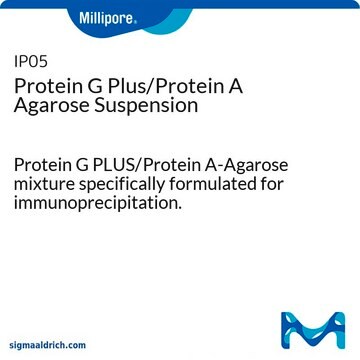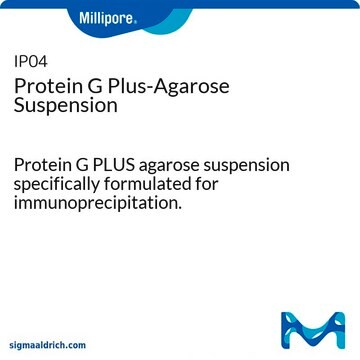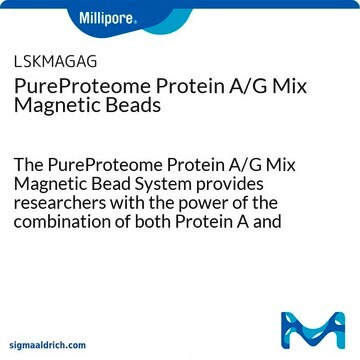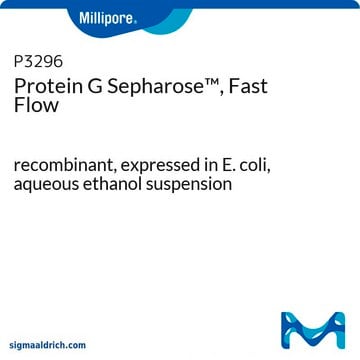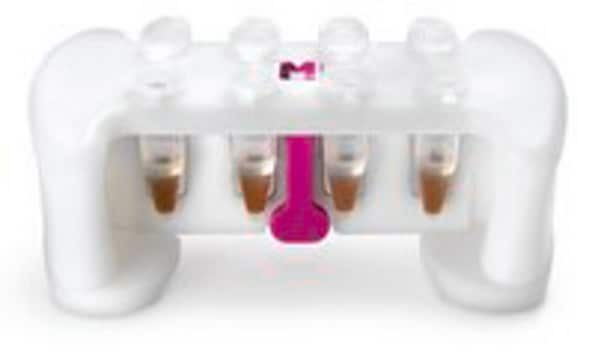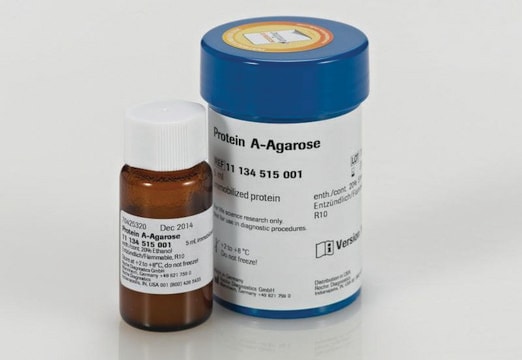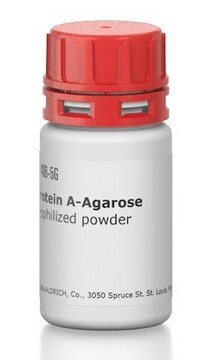추천 제품
양식
slurry (Liquid)
포함
≤0.1% sodium azide as preservative
제조업체/상표
Calbiochem®
저장 조건
do not freeze
기술
protein purification: suitable
적합성
suitable for microbiology
배송 상태
wet ice
저장 온도
2-8°C
일반 설명
A mixture of Protein G PLUS and Protein A covalently conjugated to agarose. Useful for purification of IgG from biological fluids.
Designed for immunoglobulin purification at low pressure. Product size refers to the volume of packed beads.
애플리케이션
Antibody Purification
경고
Toxicity: Standard Handling (A)
물리적 형태
50% suspension in PBS.
기타 정보
Note: the product size refers to the volume of packed beads. This product can be used directly with serum, plasma, tissue culture media, ascites, or other biological fluids, but if sufficient quantities of starting material are available we recommend an initial clean up step. The column life will be greatly extended if aggregated proteins and lipids are removed from the immunoglobulin in the clean up step. Use 5-10 ml of packed beads per ml serum.
Recommended Protocol for IgG Purification
Buffers
All concentrations stated are for working solutions, not the 10X concentrates. Caution: sodium azide is poison.
• Binding/Washing Buffer: 100 mM sodium phosphate pH 7.0, 150 mM sodium chloride, 5 mM sodium EDTA, 0.01% sodium azide.
• Elution Buffer A (see Note section): 500 mM ammonium acetate pH 3.0, 0.01% sodium azide.
• Elution Buffer B: 10 mM glycine/HCl pH 3.0, and 0.01% sodium azide.
• Neutralization Buffer: 500 mM Tris Base, 0.01% sodium azide.
• Storage Buffer: 100 mM sodium phosphate, pH 7.0, 0.01% sodium azide.
Protocol
A. Clean Up and Concentration
Ascites and serum should be clotted at room temperature, refrigerated at 4°C overnight (to allow the clot to shrink and lipids to separate), and centrifuged multiple times to remove all clotted protein and lipid. Remove the lipid from the top of the centrifuge tube with a glass rod or small wooden stick. Tissue culture media should be centrifuged or filtered to remove aggregates.
IgG can be concentrated and partially purified by use of an ammonium sulfate precipitation step. Add ammonium sulfate to 50% saturation (313 g per L) with stirring and check the pH adjusting to 7.0 by addition of 1 M HCl or NaOH. Centrifuge to collect precipitated immunoglobulin, dissolve in binding buffer and dialyze against the same buffer.
B. Purification
1. Pack a column with the Agarose Conjugate.
2. Wash with about 20 column volumes Washing/Binding Buffer until pH of eluate is 7.0.
3. If IgG has not been previously dialyzed against binding buffers dilute or dialyze IgG-containing sample into the Washing/Binding Buffer (pH 6.5-7.5).
4. Load sample onto column.
5. Wash with Washing/Binding Buffer until the absorbance of the eluate at 280 nm approaches background level.
6. Wash with Elution Buffer A to elute IgG, and collect fractions until A280 returns to background levels.
7. Wash with Elution Buffer B, and collect fractions until A280 returns to background. Most IgG should elute with buffer A.
8. Neutralize eluted IgG fractions by addition of an equal volume of neutralization buffer and check the pH with pH paper. For best results, neutralize eluate promptly.
9. To re-use the column immediately, repeat procedure from Step 2.
10. To prepare the column for storage, wash column with 5 column volumes of Elution Buffer B.
11. To store column wash with 30 column volumes storage buffer; then seal column outlets and store in refrigerator.
12. Quantitate the purified IgG using the formula:
Absorbance at 280 nm/1.4 = Concentration (mg/ml).
To make Elution Buffer A, start with acetic acid and adjust the pH to 3.0 with ammonium hydroxide.
Recommended Protocol for IgG Purification
Buffers
All concentrations stated are for working solutions, not the 10X concentrates. Caution: sodium azide is poison.
• Binding/Washing Buffer: 100 mM sodium phosphate pH 7.0, 150 mM sodium chloride, 5 mM sodium EDTA, 0.01% sodium azide.
• Elution Buffer A (see Note section): 500 mM ammonium acetate pH 3.0, 0.01% sodium azide.
• Elution Buffer B: 10 mM glycine/HCl pH 3.0, and 0.01% sodium azide.
• Neutralization Buffer: 500 mM Tris Base, 0.01% sodium azide.
• Storage Buffer: 100 mM sodium phosphate, pH 7.0, 0.01% sodium azide.
Protocol
A. Clean Up and Concentration
Ascites and serum should be clotted at room temperature, refrigerated at 4°C overnight (to allow the clot to shrink and lipids to separate), and centrifuged multiple times to remove all clotted protein and lipid. Remove the lipid from the top of the centrifuge tube with a glass rod or small wooden stick. Tissue culture media should be centrifuged or filtered to remove aggregates.
IgG can be concentrated and partially purified by use of an ammonium sulfate precipitation step. Add ammonium sulfate to 50% saturation (313 g per L) with stirring and check the pH adjusting to 7.0 by addition of 1 M HCl or NaOH. Centrifuge to collect precipitated immunoglobulin, dissolve in binding buffer and dialyze against the same buffer.
B. Purification
1. Pack a column with the Agarose Conjugate.
2. Wash with about 20 column volumes Washing/Binding Buffer until pH of eluate is 7.0.
3. If IgG has not been previously dialyzed against binding buffers dilute or dialyze IgG-containing sample into the Washing/Binding Buffer (pH 6.5-7.5).
4. Load sample onto column.
5. Wash with Washing/Binding Buffer until the absorbance of the eluate at 280 nm approaches background level.
6. Wash with Elution Buffer A to elute IgG, and collect fractions until A280 returns to background levels.
7. Wash with Elution Buffer B, and collect fractions until A280 returns to background. Most IgG should elute with buffer A.
8. Neutralize eluted IgG fractions by addition of an equal volume of neutralization buffer and check the pH with pH paper. For best results, neutralize eluate promptly.
9. To re-use the column immediately, repeat procedure from Step 2.
10. To prepare the column for storage, wash column with 5 column volumes of Elution Buffer B.
11. To store column wash with 30 column volumes storage buffer; then seal column outlets and store in refrigerator.
12. Quantitate the purified IgG using the formula:
Absorbance at 280 nm/1.4 = Concentration (mg/ml).
To make Elution Buffer A, start with acetic acid and adjust the pH to 3.0 with ammonium hydroxide.
법적 정보
CALBIOCHEM is a registered trademark of Merck KGaA, Darmstadt, Germany
Storage Class Code
11 - Combustible Solids
WGK
WGK 1
Flash Point (°F)
Not applicable
Flash Point (°C)
Not applicable
시험 성적서(COA)
제품의 로트/배치 번호를 입력하여 시험 성적서(COA)을 검색하십시오. 로트 및 배치 번호는 제품 라벨에 있는 ‘로트’ 또는 ‘배치’라는 용어 뒤에서 찾을 수 있습니다.
Meihan Liu et al.
International journal of biological sciences, 15(3), 617-627 (2019-02-13)
Metformin, a common therapeutics for type 2 diabetics, was recently demonstrated to possess antitumor activity in various cancer types. However, its therapy effect in renal cell carcinoma (RCC) still remains controversial. In this study, we found that metformin treatment in
Paul F Bradfield et al.
Arthritis and rheumatism, 48(9), 2472-2482 (2003-09-18)
A characteristic feature of the inflammatory infiltrate in rheumatoid arthritis is the segregation of CD4 and CD8 T lymphocyte subsets into distinct microdomains within the inflamed synovium. The aim of this study was to test the hypothesis that chemokines in
Michelle A Schultz et al.
PloS one, 9(1), e87204-e87204 (2014-01-28)
Despite androgen deprivation therapy (ADT), persistent androgen receptor (AR) signaling enables outgrowth of castration resistant prostate cancer (CRPC). In prostate cancer (PCa) cells, ADT may enhance AR activity through induction of oxidative stress. Herein, we investigated the roles of Nrf1
Yuge Jiang et al.
Cell death discovery, 8(1), 404-404 (2022-10-02)
Sevoflurane anesthesia is reported to repress neurogenesis of neural stem cells (NSCs), thereby affecting the brain development, but the underlying mechanism of sevoflurane on the proliferation of NSCs remains unclear. Thus, this study aims to discern the relationship between sevoflurane
Xu Liu et al.
Nature communications, 7, 12768-12768 (2016-09-15)
The antagonistic crosstalk between gibberellic acid (GA) and abscisic acid (ABA) plays a pivotal role in the modulation of seed germination. However, the molecular mechanism of such phytohormone interaction remains largely elusive. Here we show that three Arabidopsis NUCLEAR FACTOR-Y
관련 콘텐츠
We manufacture IP and antibody purification agarose beads that purify immunoglobulins and IgG fractions. Our kits also provide a total antibody purification process
자사의 과학자팀은 생명 과학, 재료 과학, 화학 합성, 크로마토그래피, 분석 및 기타 많은 영역을 포함한 모든 과학 분야에 경험이 있습니다..
고객지원팀으로 연락바랍니다.